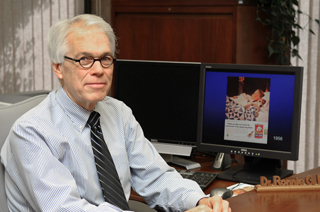September 7, 2011
Pets, people: Elmore studies human-animal bond

Pets matter. They’ve been known to save a family from a burning home, wait patiently at the door for their owner to return from a long day at work, and to bring comfort in good times and bad.
Yet the role of pets continues to evolve, said Ronnie Elmore, associate dean of the College of Veterinary Medicine at Kansas State University.
Elmore, a veterinarian, is a keen observer of people and their pets, and a collector of magazine cover art in which artists have captured the human-animal bond.
In the last 100 years, family pets have moved from the yard to the bedroom, said Elmore, who noted that artists initially placed the family dog in the yard, looking at the home. The dog has since moved from the yard to the porch, then to the living room rug, the sofa, the bedroom rug and now, often is pictured tucked in next to his or her owner.
While each magazine cover represents an artist’s view, the evolution of the relationship speaks to the human-animal bond, said Elmore, who is organizing an upcoming conference focusing on the importance of including family pets and animals in emergency management plans.
The free conference is “Natural Disasters: What About the Animals?” It will be 8 a.m. to 4 p.m. Sept. 24 in Forum Hall in the K-State Student Union. It will also be simulcast at the K-State Olathe Campus, 22201 College Blvd., and webcast.
Conference sessions and presenters include:
* A book review on Dave Eggers’ “Zeitoun,” which focuses on Hurricane Katrina, New Orleans’ residents and their pets. The book was selected as a required read for freshman at Kansas State this year. The review will be presented by English professor Greg Eiselein.
* A firsthand account of handling animals following Katrina by Joseph Taboada, a doctor of veterinary medicine at Louisiana State University.
* Lessons learned from Katrina by Lisa Greenhill, public and environmental health policy professional, Association of American Veterinary Medical Colleges.
* Lessons learned following the Greensburg tornado by Christen L. Skaer, a Wichita veterinarian, director of Sedgwick County and Kansas’ State Animal Response Teams and manager of the Kansas Veterinary Medical Reserve Corps, and:
* Personal experiences and lessons learned by Pam Muntz, Greensburg, whose cocker spaniel survived the tornado which destroyed the Muntz home. The dog has since become the family’s weather forecaster.
The conference is recommended for pet owners, emergency management professionals, educators, local government officials, anyone connected with veterinary medicine, students, 4-H and other youth development professionals working with youth and animals.
Pat Payne, doctor of veterinary medicine and associate professor at K-State’s College of Veterinary Medicine, noted that, in addition to including a pet leash, food, water, medications, familiar toy or blanket and pet carrier in the family’s emergency kit or shelter, pet owners should include vaccination records and a photo of the pet in the event it becomes separated from the family.
Payne, whose specialty is diagnostic medicine and pathobiology, is a volunteer puppy raiser for KSDS Inc., based in Washington, Kan., which provides guide, service and social dogs.
Also coordinating the program are Deb Sellers, K-State Research and Extension specialist in adult development and aging, and Ralph Richardson, a veterinarian and dean of K-State’s College of Veterinary Medicine.
Sellers is experienced in the human-animal bond as it relates to older adults and aging, and is a volunteer puppy raiser for Canine Companions for Independence, which provides assistance dogs.
More information on the conference is available online: www.vet.ksu.edu/CE/Conference.htm; at K-State Research and Extension offices, and on eXtension, a national effort to support educational outreach via the Family Caregiving and Companion Animals Community of Practice
For more information on assistance dogs, contact Sellers at 785-532-5773 or Payne at 785-532-4604.
The conference is sponsored by K-State’s College of Veterinary Medicine, K-State Research and Extension, and eXtension.
